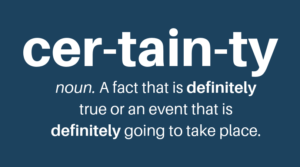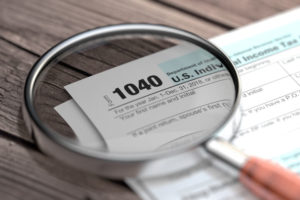It’s the Final Countdown to Tax Day
Ready, set, file! The countdown is on for this year’s Tax Season and with less than a week to go until April 15th, pressure may be mounting to finalize your taxes. Whether you have a trusted professional do your taxes or you are a do-it-yourself tax return filer, one thing holds true, taxes are a certainty for most Americans.

Since April 15th is a definite and 1 in 3 Americans wait until April to file their tax returns, a couple of quick tips may make paying Uncle Sam a little less “taxing”.
1.) Gather all required paperwork.
There are over one thousand IRS tax forms for reporting income, expenses, or other financial data – with every piece of paperwork comes the appropriate form to file your taxes. The most popular forms filed in the United States are in the Form 1040 family. Prior to tax year 2018, the 1040EZ was the most common version utilized of the required tax forms, while the more complex 1040A allowed for more deductions. With the 2018 tax filing season, the IRS released the redesigned Form 1040 in conjunction with tax reform. The new Form 1040 is more of a tax summary and is now combined with the six new supporting schedules designed for everything else. The new 1040 consolidated the 1040, 1040A and 1040EZ into one form that all taxpayers use.
For more information, here is the IRS link to the new Form 1040:
https://www.irs.gov/pub/irs-pdf/f1040.pdf
 2.) What tax schedule applies to me?
2.) What tax schedule applies to me?
A tax schedule is an IRS form that is required in addition to your tax return when certain deductions or income need to be included on the standard 1040. The IRS basically shortened the Form 1040 and moved more specific and important tax situations to the six new schedules. As an example, Schedule “1” needs to be used when a taxpayer has additional income such as capital gains or unemployment earnings and/or has additional deductions such as student loan interest or self-employment tax. Schedule “4” would be used in situations where other taxes such as self-employment tax or IRA tax need to be considered.
For more information, here is the IRS link to the new tax schedules:
https://www.irs.gov/forms-pubs/about-form-1040
3.) Double and triple check your return before submitting.
Historically, about twenty-five percent of all tax filing volume gets processed in April, including extensions. With more American’s waiting until the last minute, rushing to meet the deadline may contribute to unnecessary filing errors. Mistakes may include incorrect filing status, clerical errors, or mathematical miscalculations – all of which may affect important credits or missing deductions. Most importantly, if you are owed a refund and planning to have it direct deposited, be sure to enter correct bank account information on your return. The IRS will not assist in recovering your money if it ends up in someone else’s bank account. Check, check, and triple check!
4.) If you still aren’t quite ready to file your taxes by the deadline, the IRS allows you to request a six-month extension.
Luckily, the IRS  “automatically” grants extensions to taxpayers who ask for them before April 15th. Extension requestors take note – an extension of time to file gives you more time to get paperwork in order, determine which schedules may apply to your tax situation, and meet with your tax professional to triple check your return. An extension does not grant you an extension of time to pay any taxes you owe. Even with an approved extension, any taxes owed are still due on April 15th by 11:59PM, otherwise, you may be subject to interest and penalties.
“automatically” grants extensions to taxpayers who ask for them before April 15th. Extension requestors take note – an extension of time to file gives you more time to get paperwork in order, determine which schedules may apply to your tax situation, and meet with your tax professional to triple check your return. An extension does not grant you an extension of time to pay any taxes you owe. Even with an approved extension, any taxes owed are still due on April 15th by 11:59PM, otherwise, you may be subject to interest and penalties.
For more information, here is the IRS link about extensions:
https://www.irs.gov/forms-pubs/extension-of-time-to-file-your-tax-return
Ready, set, file!
By Susan Amsler
April 7th, 2019
Randolph Business Resources, LLC.
Our experienced staff are ready to lend a hand to you and your business.
Visit us @ www.randolphacctg.com
Call us at: (615)202-5829 if you need immediate assistance
